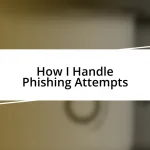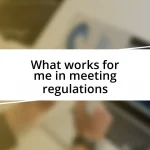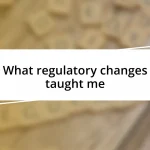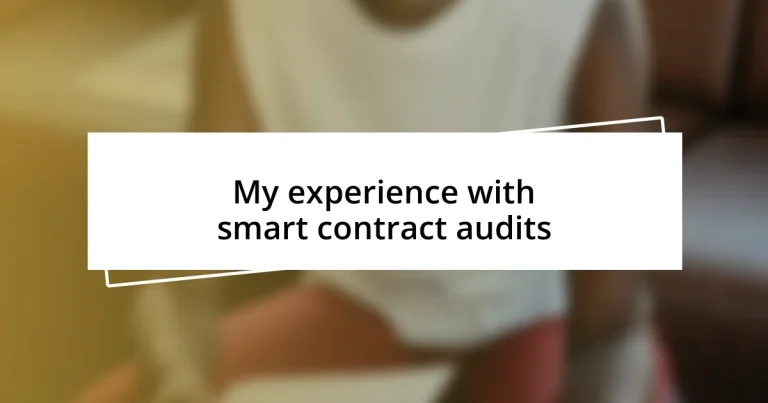Key takeaways:
- Smart contracts are self-executing agreements written in code, enabling automation without intermediaries, which can revolutionize transaction processes.
- Smart contract audits are essential for identifying vulnerabilities, enhancing trust, and improving code quality, with various stages including code review, automated and manual testing, and final assessment.
- Key lessons learned from audits include the importance of thorough documentation, ongoing education in emerging vulnerabilities, and collaboration with audit firms to improve security outcomes.
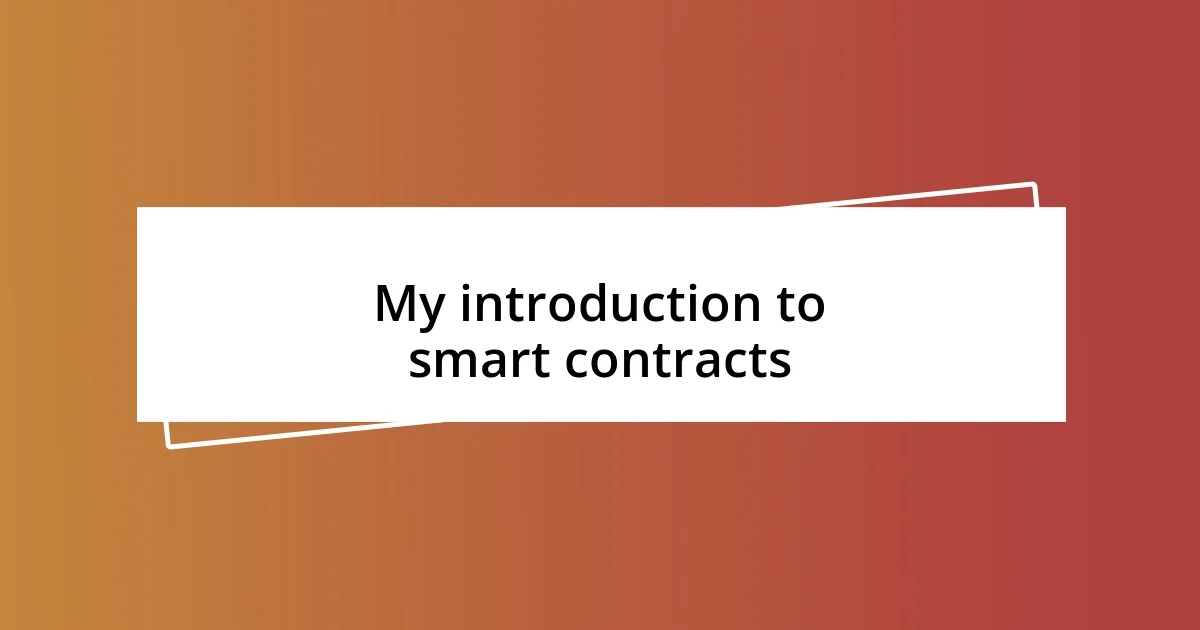
My introduction to smart contracts
My journey with smart contracts began almost by accident. I stumbled upon them while delving into blockchain technology, and I remember thinking, “What exactly makes these contracts so ‘smart’?” That spark of curiosity ignited a fascination that has only deepened over time.
As I explored further, I realized that smart contracts are essentially self-executing agreements with the terms of the agreement directly written into code. The idea that I could automate processes without the need for intermediaries felt revolutionary. It was like discovering a tool that could potentially reshape how transactions occur, and I couldn’t help but wonder how we had survived without them for so long!
I vividly recall my first attempt to create a simple smart contract. It was both exhilarating and nerve-wracking. I made a few mistakes, but each obstacle felt like a valuable lesson. The thrill of getting it right, witnessing the code execute as intended, left me with a sense of accomplishment that I hadn’t experienced in quite a while. Isn’t it amazing how learning something new can invigorate your passion for technology?
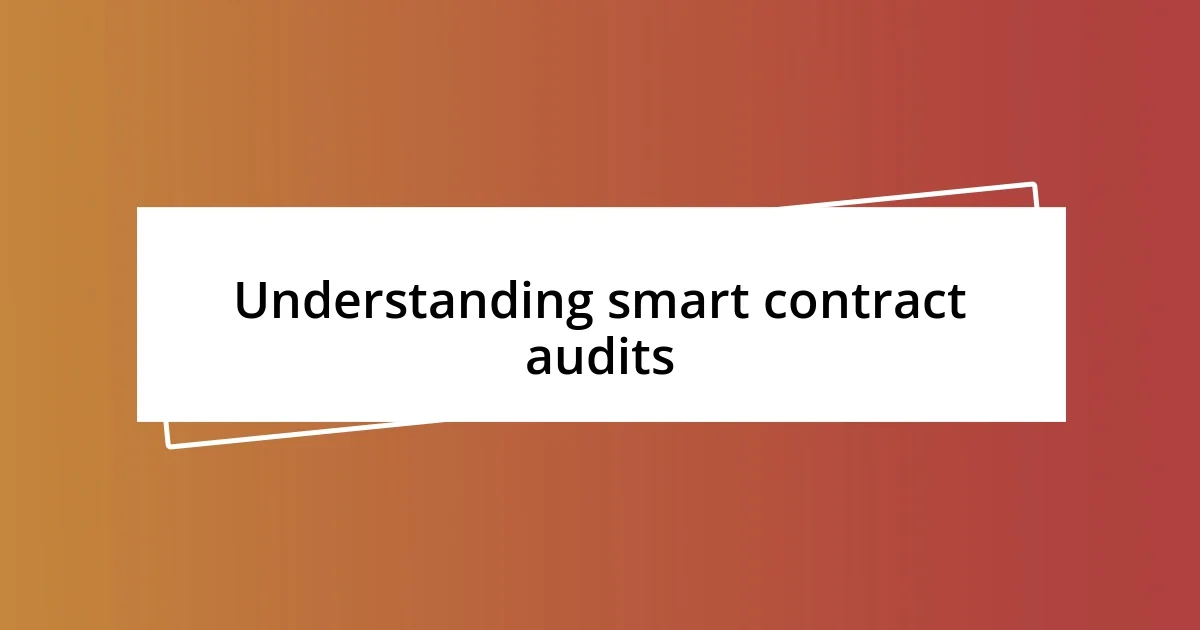
Understanding smart contract audits
Understanding smart contract audits is crucial for ensuring the security and reliability of these digital agreements. When I first learned about smart contract audits, I was struck by their importance in identifying vulnerabilities that could lead to catastrophic failures. It’s a bit like hiring a trusted inspector before buying a house; you want to make sure everything is sound and secure before committing.
Through my experience, I’ve seen how audits can catch everything from coding errors to logic flaws. It reminds me of the time I was developing a contract for a crowdfunding project; after an audit, I realized I had overlooked a potential exploit that could have cost me dearly. That moment underscored the value of having a fresh set of eyes on my code, validating its trustworthiness.
It’s fascinating how the audit process not only enhances security but also fosters a sense of community in the blockchain space. I often engage with peers who share their audit experiences, and it feels like we’re all working towards a common goal—building a more secure and robust ecosystem. When you share insights about successful audits or lessons learned from failures, it enriches our collective understanding.
| Aspect | Importance |
|---|---|
| Identify Vulnerabilities | Audits catch security flaws before contracts go live. |
| Enhance Trust | Audited contracts build user confidence. |
| Improve Code Quality | Feedback during audits leads to better overall design. |
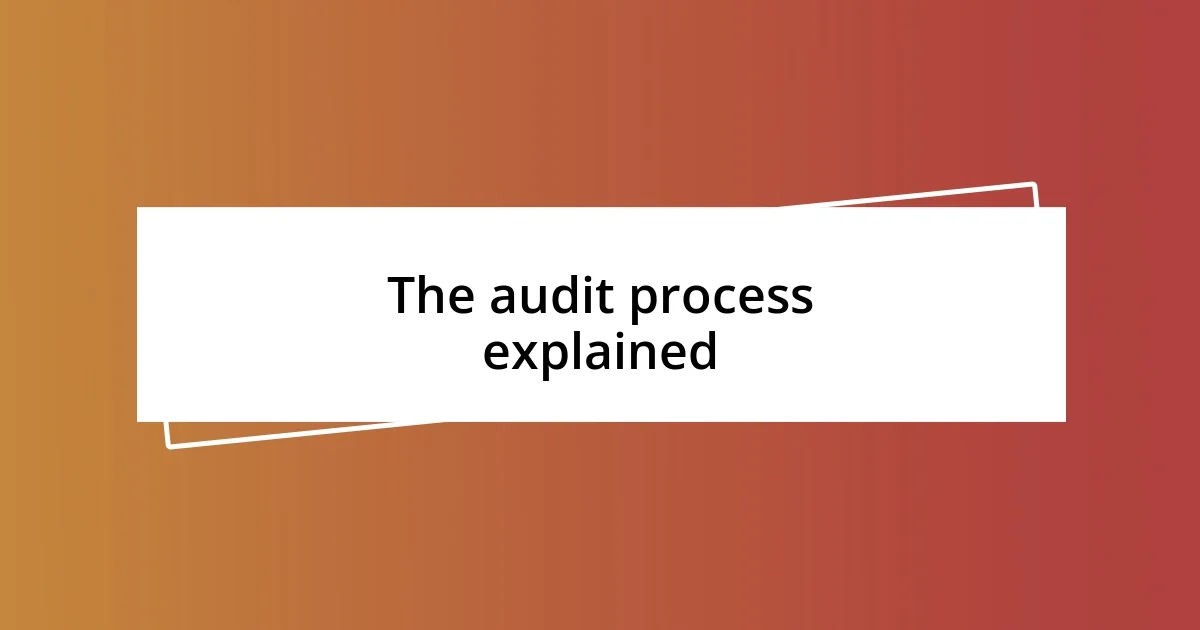
The audit process explained
The audit process is a meticulous and essential step in ensuring the integrity of smart contracts. From my experience, the journey begins with code review, where auditors comb through every line of code, analyzing for potential vulnerabilities. It’s a bit like dissecting a puzzle; each piece must fit perfectly for the final picture to hold together. I remember feeling a blend of anticipation and anxiety during this stage, knowing how critical it was for the success of my contract.
Here’s a quick breakdown of what the audit process entails:
- Code Review: Auditors examine the code for logical flaws and security vulnerabilities.
- Automated Testing: Tools are employed to run tests and scenarios that may reveal weaknesses.
- Manual Testing: Auditors manually assess the contract’s functionality against various use cases.
- Feedback Loop: After identifying issues, there’s an iterative process where fixes are made and reviewed.
- Final Assessment: A comprehensive report is generated, detailing any flaws and the auditor’s recommendations.
Every step in this process contributes to a sense of relief and confidence. I vividly recall the tension I felt waiting for the final report after my first audit. When I received the confirmation that my contract was secure, it felt like lifting an immense weight off my shoulders. The thoroughness of the auditors not only ensured my project was safe but also instilled a level of assurance in my investors, which was invaluable.
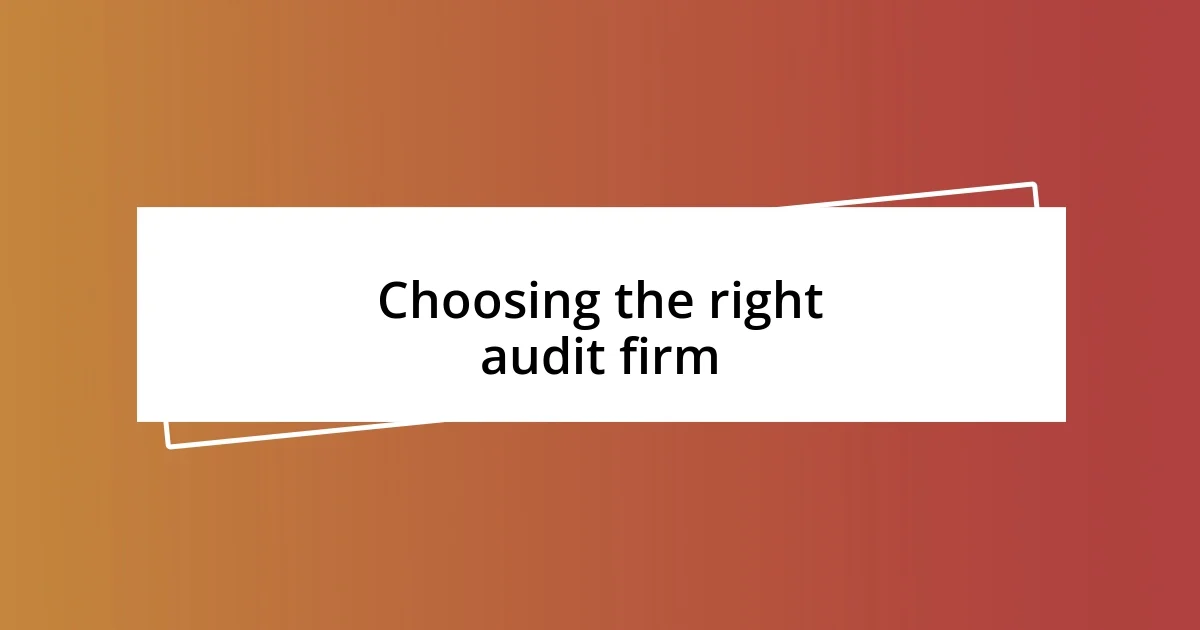
Choosing the right audit firm
Choosing the right audit firm can make a significant difference in the outcome of your smart contract. In my experience, it’s not just about finding a firm; it’s about establishing a partnership. I remember sifting through various options, asking myself, “What criteria should I prioritize?” I focused on the firm’s reputation and past projects since a proven track record often speaks volumes.
When evaluating potential firms, don’t hesitate to ask for references or case studies. I once reached out to a previous client of a firm I was considering, and their feedback was invaluable. It was during that conversation that I learned the importance of clear communication. A firm’s willingness to explain their process and findings can really enhance your understanding and comfort level throughout the audit.
Finally, consider the firm’s specialization. In my own journey, I found that not all audit firms cover the same territory. Some focus on particular blockchain platforms or types of contracts, which can influence the depth of their review. Choosing a firm that aligns with your project’s unique needs can lead to more insightful audits. Have you thought about the specific aspects of your contract that might require specialized attention? I know I definitely did, and it paid off in spades.
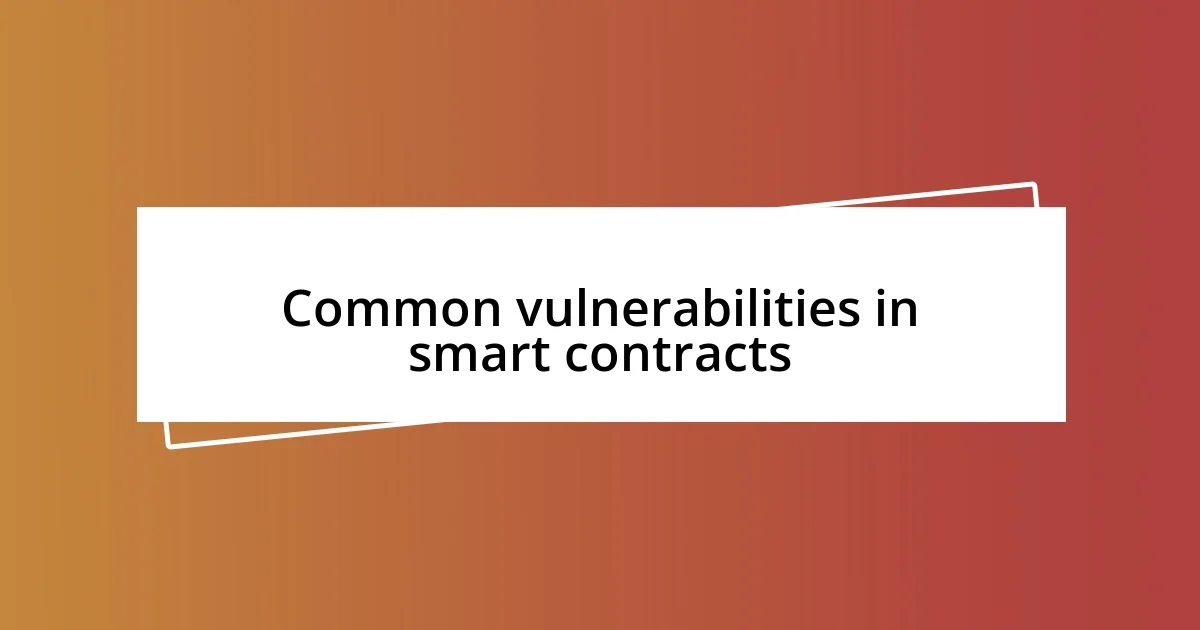
Common vulnerabilities in smart contracts
One of the most common vulnerabilities I’ve encountered in smart contracts is reentrancy. This occurs when an external contract calls back into the vulnerable contract before its initial execution is complete. I recall advising a friend on a project where we had to implement protective measures against this vulnerability. It was eye-opening to see how a simple oversight could turn a secure contract into a target for malicious attacks.
Another frequent issue is integer overflow and underflow. These can lead to unexpected behaviors, such as a user draining funds or causing erroneous calculations. I once participated in an audit that revealed a hidden integer overflow, which could have led to significant financial losses. It’s amazing to think how a tiny bug in numerical calculations could snowball into a massive exploit if left unchecked.
Lastly, proper access control is often overlooked. I remember working on an early project where anyone could execute critical functions due to poorly defined permissions. This lack of control can lead to unauthorized actions and ultimately compromise the entire contract’s integrity. It’s a stark reminder that security is not just about the code but also about who gets to interact with it. Wouldn’t you agree that ensuring only the right people have access is fundamental to maintaining a secure environment?
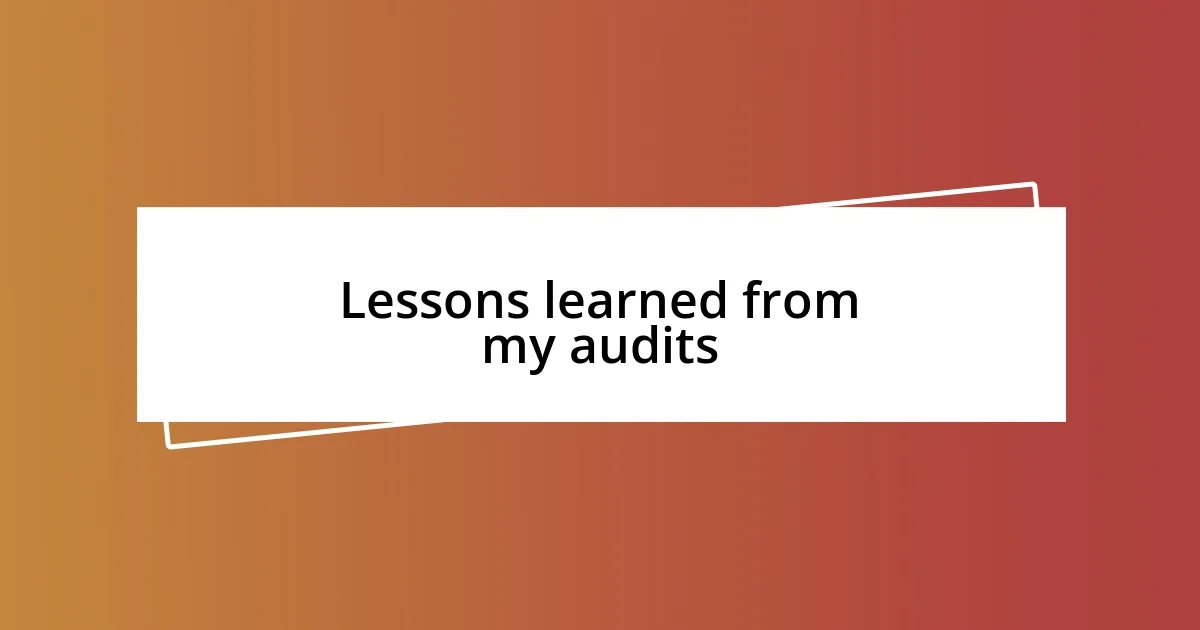
Lessons learned from my audits
Reflecting on my audit experiences, one significant lesson was the need for early and thorough documentation. In one project, I experienced the chaos that ensued when we hadn’t properly documented our contract’s intended functionality. It was frustrating, as miscommunications arose during the audit, leading to delays and additional costs. I’ve come to realize that comprehensive documentation not only facilitates the audit process but also serves as a roadmap for developers and auditors alike.
Another takeaway was the necessity of ongoing education in the fast-evolving blockchain landscape. I vividly remember attending a workshop after one audit that exposed me to emerging vulnerabilities I had never encountered before. Engaging with other professionals in the field widened my perspective and made me appreciate the value of continual learning. Aren’t we all just a few breakthroughs away from making our contracts more robust?
Lastly, I learned the true importance of collaboration during the audit process. During my first audit experience, I naively thought that once the audit began, my involvement was minimal. But I quickly discovered that staying engaged with the audit firm and providing feedback greatly enhanced the final results. That collaborative approach not only boosted the quality of our security measures but also drew me closer to the team of auditors, turning a transactional relationship into a meaningful partnership. What about you? Have you ever found collaboration to open unexpected doors?








